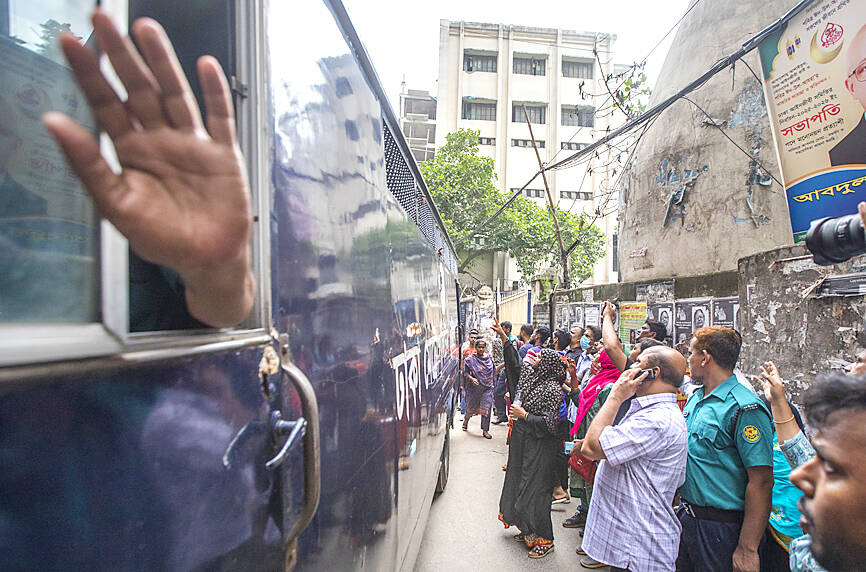A Bangladeshi student group has vowed to resume protests that sparked a lethal police crackdown and nationwide unrest unless several of their leaders are released from custody yesterday.
Last week’s violence killed at least 205 people, an Agence France-Presse count of police and hospital data showed, in one of the biggest upheavals of Bangladeshi Prime Minister Sheikh Hasina’s 15-year tenure.
Army patrols and a nationwide curfew remain in place more than a week after they were imposed, and a police dragnet has scooped up thousands of protesters including at least half a dozen student leaders.

Photo: EPA-EFE
Members of Students Against Discrimination, whose campaign against civil service job quotas precipitated the unrest, said they would end their week-long protest moratorium.
The group’s leader Nahid Islam and others “should be freed and the cases against them must be withdrawn,” Abdul Hannan Masud told reporters in an online briefing late on Saturday.
Masud, who did not disclose his location because he was in hiding from authorities, also demanded that “visible actions” be taken against government ministers and police officers responsible for the deaths of protesters.
“Otherwise, Students Against Discrimination will be forced to launch tough protests” from today, he said.
Islam and two other senior members of the protest group were on Friday forcibly discharged from hospital in the capital, Dhaka, and taken away by a group of plainclothes detectives.
Earlier last week, Islam said he was being treated at a hospital for injuries police inflicted on him during an earlier round of detention and said he was in fear for his life.
Bangladeshi Minister of Home Affairs Asaduzzaman Khan on Friday told reporters that the trio were taken into custody for their own safety, but did not confirm if they had been formally arrested.
Police yesterday said that detectives had taken two others into custody, while a Students Against Discrimination activist said that a third had been taken yesterday morning.
At least 9,000 people have been arrested nationwide since the unrest began, Bangladesh’s largest daily newspaper, Prothom Alo, reported.
While a curfew imposed on July 20 remains in effect, it had been progressively eased through last week, in a sign of the Hasina administration’s confidence that order was gradually being restored.
Bangladeshi Minister of State for Posts, Telecommunications and Information Technology Zunaid Ahmed Palak told reporters that the country’s mobile Internet network would be restored later yesterday, 11 days after a nationwide blackout imposed at the height of the unrest.

Shamans in Peru on Monday gathered for an annual New Year’s ritual where they made predictions for the year to come, including illness for US President Donald Trump and the downfall of Venezuelan President Nicolas Maduro. “The United States should prepare itself because Donald Trump will fall seriously ill,” Juan de Dios Garcia proclaimed as he gathered with other shamans on a beach in southern Lima, dressed in traditional Andean ponchos and headdresses, and sprinkling flowers on the sand. The shamans carried large posters of world leaders, over which they crossed swords and burned incense, some of which they stomped on. In this

Indonesia yesterday began enforcing its newly ratified penal code, replacing a Dutch-era criminal law that had governed the country for more than 80 years and marking a major shift in its legal landscape. Since proclaiming independence in 1945, the Southeast Asian country had continued to operate under a colonial framework widely criticized as outdated and misaligned with Indonesia’s social values. Efforts to revise the code stalled for decades as lawmakers debated how to balance human rights, religious norms and local traditions in the world’s most populous Muslim-majority nation. The 345-page Indonesian Penal Code, known as the KUHP, was passed in 2022. It

Near the entrance to the Panama Canal, a monument to China’s contributions to the interoceanic waterway was torn down on Saturday night by order of local authorities. The move comes as US President Donald Trump has made threats in the past few months to retake control of the canal, claiming Beijing has too much influence in its operations. In a surprising move that has been criticized by leaders in Panama and China, the mayor’s office of the locality of Arraijan ordered the demolition of the monument built in 2004 to symbolize friendship between the countries. The mayor’s office said in

‘TRUMP’S LONG GAME’: Minnesota Governor Tim Walz said that while fraud was a serious issue, the US president was politicizing it to defund programs for Minnesotans US President Donald Trump’s administration on Tuesday said it was auditing immigration cases involving US citizens of Somalian origin to detect fraud that could lead to denaturalization, or revocation of citizenship, while also announcing a freeze of childcare funds to Minnesota and demanding an audit of some daycare centers. “Under US law, if an individual procures citizenship on a fraudulent basis, that is grounds for denaturalization,” US Department of Homeland Security Assistant Secretary Tricia McLaughlin said in a statement. Denaturalization cases are rare and can take years. About 11 cases were pursued per year between 1990 and 2017, the Immigrant Legal Resource